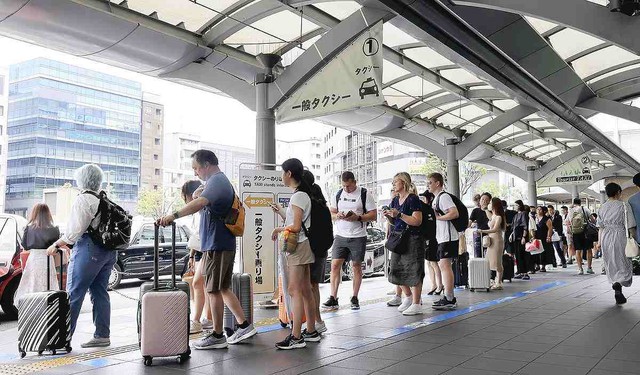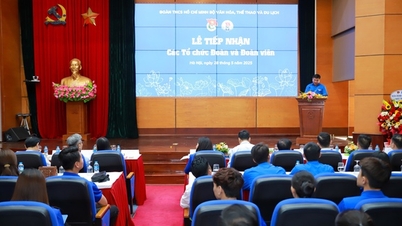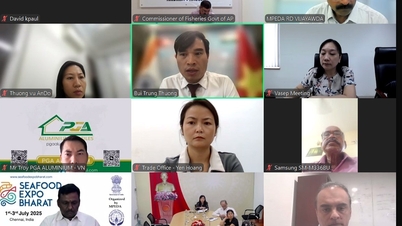According to Japan News, tourism is recovering rapidly from the Covid-19 pandemic. As domestic tourism affects the economy more and more, the negative impacts on the natural environment and the lives of local people are becoming more evident in areas with high tourist density.

Long lines of tourists waiting for taxis at JR Kyoto Station. Photo: The Yomiuri Shimbun
Promoting sustainable tourism for the benefit of residents and tourists
Faced with this issue, the trend of sustainable tourism will be the choice of many countries, including Japan, for the benefit of both residents and tourists. More and more tourists coming to Japan are becoming more aware of local culture, economy and environment during their trips.
Key to driving growth will be a shift to a “staycation” model that encourages people to stay in one place to enjoy life rather than taking quick trips.
According to the Japan National Tourism Organization, an estimated 2,516,500 foreign tourists visited Japan in October 2023. This is the first time that the monthly figure has exceeded the figure for the same period before the pandemic, and the number of visitors to Japan is likely to remain stable in 2024.
As tourists return after Covid-19, concerns about the impact on people’s lives due to excessive disorder and bad behavior are a concern for the Japanese tourism industry. As a result, tourist satisfaction has also decreased.
Therefore, adopting a “sustainable tourism” approach, which aims to preserve destinations in their original state and satisfy all stakeholders, including tourists, residents and businesses, is essential.
The United Nations World Tourism Organization has defined sustainable tourism as compatible with the needs of tourists, the industry, the environment and the host region, while taking into full consideration current and future environmental, socio-cultural and economic impacts.
Tourism development will contribute to promoting local economic growth while protecting local communities, natural environments and cultures. It is the type of tourism model that not only promotes development in the present but also in the future.
Transforming tourism model from quantity to quality
In 2023, the Japanese government announced a new National Tourism Promotion Basic Plan. The plan aims to shift from quantity to quality in its tourism strategy, increasing not only the number of tourists but also the amount they spend. The Japanese government listed three strategies: "Creating sustainable tourism destinations," "Revitalizing domestic tourism," and "Expanding domestic exchanges."
Over the past 10 years, the number of repeat visitors to Japan has increased, and the proportion of foreign visitors who have visited Japan for a second time or more is expected to exceed 70%. While domestic visitors and international visitors usually visit for just one or two nights, the average length of stay for foreign visitors is more than 7 nights. After visiting famous tourist and shopping spots, international visitors are increasingly interested in learning about Japanese culture and traditional lifestyles.
For example, Ozu in Ehime Prefecture is a castle town with a historic townscape of traditional wooden townhouses called machiya. Here, visitors can stay in the castle for more than 1 million yen per night, which has attracted public attention. Castle hotels are a favorite destination for domestic tourists, with staff dressed as warriors ready to greet visitors at the airport and help them experience dressing up as a lord, lady or princess living in a castle.
In addition to promoting attractions, sustainable tourism development also requires the coordination of hotel staff, business owners and local government officials.
In March 2023, Ozu City was selected as one of the "World's Top 100 Sustainable Tourism Destinations" for the second consecutive year by the Dutch international certification organization Green Destinations. In addition, Ozu also became the first Japanese city to win first place globally in the "Culture & Tradition" category at the "ITB Berlin Green Destination Story Awards" held in Germany.
Survey from global travelers
In Booking.com's 2021 survey, 81% of global travelers said they want to stay in sustainable accommodations, and 43% noted they want to support more local communities and economies when they visit.
"Responsible tourists are the new global tourism trend. These tourists are the bridge to develop both domestic and international tourism and will be a sustainable resource for destinations.
In addition, tourism strategies based on tradition and nurturing local pride have increased the number of tourists to Japan.
Above all, sustainable tourism strategies must focus more on domestic tourism while protecting tourism resources and respecting the identity of the people. Nurturing the feelings of the people with the thought that "living here is good and even better when tourists come" will create sustainable tourism and turn it into a driving force for the revitalization of local communities.
Source


![[Photo] Prime Minister Pham Minh Chinh attends the event "Digital transformation of the banking industry by 2025"](https://vphoto.vietnam.vn/thumb/1200x675/vietnam/resource/IMAGE/2025/5/29/0e34cc7261d74e26b7f87cadff763eae)



![[Photo] Prime Minister Pham Minh Chinh receives leaders of Excelerate Energy Group](https://vphoto.vietnam.vn/thumb/1200x675/vietnam/resource/IMAGE/2025/5/29/c1fbe073230443d0a5aae0bc264d07fe)

































































































Comment (0)